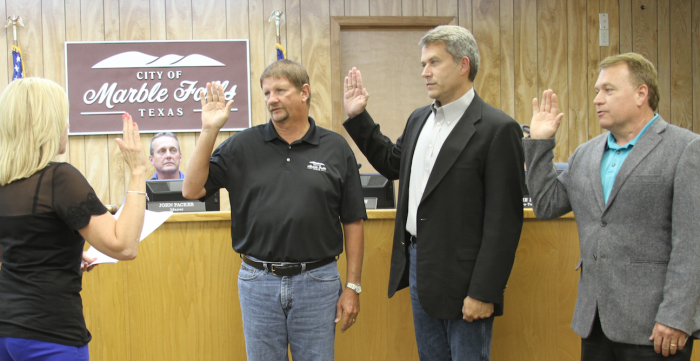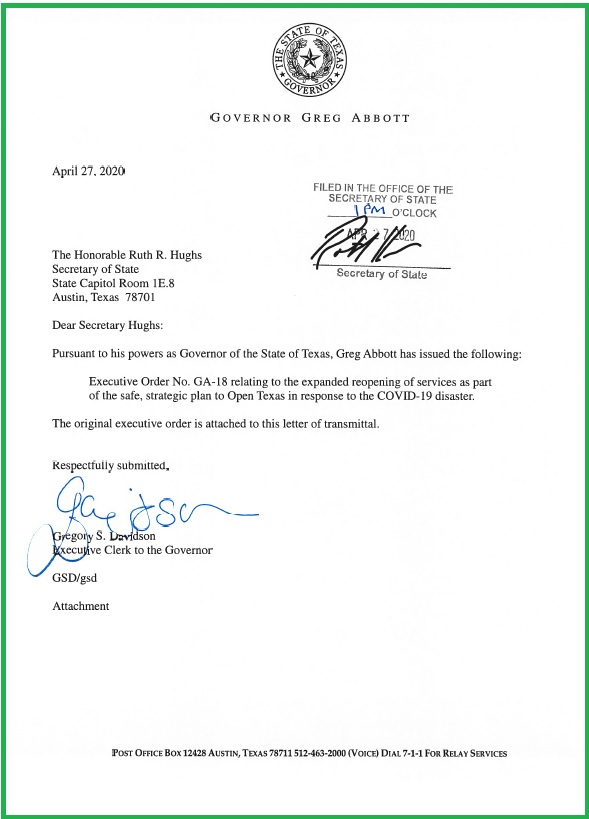Council welcomes new member, focuses on MFPD stats

GLYNIS CRAWFORD SMITH/THE HIGHLANDER
City Secretary Christina McDonald, left, administers the oath of office at the Tuesday, May 17, meeting of the Marble Falls City Council to, from left, Place 3 incumbent Reed Norman, new Place 1 member Craig Magerkurth and to Richard Westerman, assuming a full term in Place 5.
By Glynis Crawford Smith
The Highlander
Craig Magerkurth, a new Place 1 member of the Marble Falls City Council, joined two incumbents in taking the oath of office Tuesday, May 17.
Magerkurth, Reed Norman in Place 3 and Richard Westerman in Place 5 drew no opponents this year, eliminating the need for a May 7 city election.
Jane Marie Hurst was re-elected as mayor pro tem by fellow council members after City Secretary Christina McDonald will administered the oaths.
The council agenda was brief, but the meeting was long, with presentations on the Marble Falls Police Department and upcoming hearings on what might best be described as a “tree ordinance.”
The meeting had opened with a public comment from Russell Buster. The 30-year resident said he had been bringing a plea for reduced spending on the police department to the council since 2011. Essentially, he maintained the average cost to a Texas citizen for police protection is $200 each year and the cost to a Marble Falls resident is twice the amount.
A presentation by Marble Falls Police Chief Mark Whitacre shed some light on that complicated issue. One primary way Marble Falls defies comparison to cities of similar size is it's role in the tourism and economic picture of the area.
“We have a population of about 6,000,” said the chief. “But we actually serve a population (that swells to) around 15,000 daily. Our businesses provide for around 20-30,000 people...We answered 15,986 calls for service in 2015.”
Standing out among a raft of facts and figures was a major crime clearance rate of 53 percent, higher than any and double than some comparable police departments in the Central Texas area. The Marble Falls Walmart actually received corporate recognition for successful crime resolution, the chief noted.
He drew comparisons with other cities from population totals to traffic citations, drawing down to budget considerations for the new fiscal year. The current police department budget is $2,451,107, higher than some but almost certainly vying for an increase.
At the bottom line, the crime clearance rate and attention to public services such as a schools officer and animal control have come at a cost in street patrol visibility and employee retention. The force, shrunk through attrition to just 18 sworn officers (compared to 22 in the 1990's), has been faced with more and more overtime and shift change demands—1,500 hours of shift coverage this year to date. The estimated total will be 2,565 hours, exceeding $100,000 cost.
A force turnover of about 19 percent, with an attendant cost of training,, is not attributable to low salaries, Whitacre said.
“They didn't leave for more money; they needed time with their families,” he said.
Also on the agenda was a review of patrol vehicles available locally. Sgt. Barry Greer explained that four vehicles in the fleet are approaching or surpassing the 100,000-mile replacement threshold and the previous standard of Crown Victoria sedans discontinued, Marble Falls like other cities is considering sport utility vehicles (SUV's). The Ford Interceptor ($23,912 before law enforcement conversion) and the Chevrolet Tahoe ($31,069 before conversion) have met the power of the Crown Victoria, allow for fewer officer injuries and better passenger transport, while protecting weapons, electronics and other gear from intense Central Texas heat.
Assistant City Manager Caleb Kraenzel reviewed a process by the Tree Ordinance Committee, the Planning & Zoning Commission and the development department that has led to an amendment of Sections 1030-1099 of the city Landscape Ordinance and Protected Trees regulations.
The amendment will come back in June for two readings in public hearings. Removal of trees requires a city permit, whether part of structure rescue, landscaping or property development.
However in this case, some trees will be more equal than others; specifically, trees 12-inches in diameter and heritage trees, defined as 25-inches or greater in diameter. The ordinance amendment sets forth fees and penalties and accommodations for the replacement of trees or a buy-out that would allow for the replacement of a tree of similar size elsewhere in the city.






